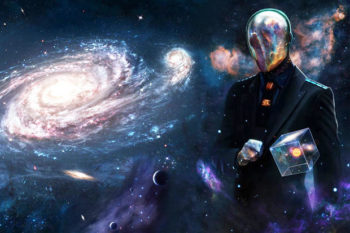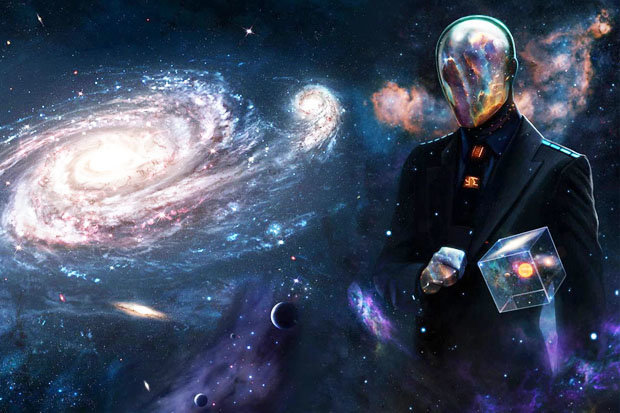The False Virtues of Anti-Love, Anti-Faith, and Anti-Hope
This post is more about the Christian faith than it is speculative, but works its way to talking about speculative fiction at the end. The title of this article may prove to be a bit misleading because I’m using the prefix “anti-” in one of its meanings in Greek, which means “as a substitute for” instead of how we usually use “anti-” in English, which is “against” or “opposite.” I’m linking an online New Testament Greek lexicon article on “ἀντί“, which if you look at it you’ll see has two definitions. Definition 1, which includes “over against” and “opposite,” is the origin of the English meaning of something that’s opposite or against something–such as these examples from a linked online English dictionary: antiwar, anti-hero, and anti-bacterial. But the second definition’s got “for, instead of, in place of (something).” It’s that second definition I’m driving at here. So by “Anti-Faith” I mean a faith in something other than where Christianity places faith. Anti-hope is likewise hope in the wrong thing. And anti-love is a substitute for love. Not the real thing but not the complete opposite, either.
(A bit off topic, but if you didn’t know already, “Antichrist” has two possible meanings in NT Greek: One who opposes Christ/is the opposite of Christ OR one who is a substitute for Christ, which isn’t the same thing as being an opposite. Which of these definitions is correct? That depends on who you ask, but I think both are right. The Antichrist will be someone who sets himself up as the equivalent of Christ, substituting, but in fact will be in opposition to Christ…)
I’m going to focus on anti-love above the others I mentioned. Because just as Christians ought to be defined by our love for one another, as per John 13:35 and I Corinthians 13 and other passages (of course far too often we are not), the modern substitute for love defines our times in a powerful way. But let me get to the subject via a personal story:
Anti-Love on the Streets of New Orleans
I mentioned last week that I’d just returned from a mission trip to Mardi Gras with a ministry called No Greater Love (I’ll shorten that as “NGL”), which seeks to evangelize certain public events including Mardi Gras in New Orleans with an emphasis in talking about the love of Christ (though they do mention repentance as well). There were other evangelistic groups I saw on the streets of the French Quarter of New Orleans, some of which had signs that said things like “GOD HATES HOMOS” and “REPENT OR BURN IN HELL.” Representing a supposed Christian message, but one focusing on wrath. Let’s call those people, “No Greater Haters.”

“No Greater Haters” in New Orleans. Photo source: Advocate.com
What the “No Greater Haters” offer is in a sense anti-love but it’s not what I meant by coining the term. Though I must say people carrying angry signs and shouting at the crowd, focusing on the wrath of God, seem to me highly unlikely to prod anyone in the direction of personal salvation. Quite the opposite.
I mean, if I were Satan (the WWSD thing I mentioned a while ago), I’d definitely work on getting the angriest and most hateful people I could find to shout the gospel with an offensive snarl, in hopes of reducing the effectiveness of anyone talking about God’s love. A bit like how Soviet propaganda films looked for the worst examples of American society to show their citizens, focusing on things like abused homeless people and racism, to counteract stories of US wealth and easy living. Perhaps instead of my cynicism about the “No Greater Haters” I should see the situation the way the Apostle Paul did in that he rejoiced even when people preached Christ with evil motivations (Philippians 1:15-18)–but in fact, I wish the “No Greater Haters” were not there at all.
But instead of anti-love as hate, what I mean by “anti-love” was seen instead in something a woman on the street shouted at us as the NGL group marched by, our lead member carrying a wooden cross as we went. Note I carried the cross part of the way both on Monday (Lundi Gras) and Tuesday (Mardi Gras), because in addition to doing other things, our group marched both days. Some people shouted at us a variety of things, some obscene (such as vulgar references to what we should do with a p-word) and some members of the crowd threw things at our group, especially at the cross. Usually Mardi Gras beads, but I also got pegged with a nearly-full can of beer from a second floor balcony. (Taking the abuse without replying in kind we saw as us demonstrating in our bodies and actions how Jesus acted when put to the cross of Calvary.)

NGL on the way to or from Bourbon Street, away from the crowds. Note in 2020 our hats were gray, to prevent them looking like MAGA hats. Source: NGL Ministry’s Facebook page
So it when a woman shouted out to us, “Find somebody to love! Find somebody to love!” it was distinctive not that she was shouting, but what she was saying. And also how angry at us she seemed as she shouted it, but without using profanity. As if we were ones not representing love, but denying love.
I immediately perceived her angry criticism, but I didn’t know right away what it was about. I wondered if maybe she was trying to say that instead of marching the street, we should be helping homeless people or something (we actually did help a number of homeless people earlier in the day, but anyway). But when she switched to screeching, “Why do you hate love? Why do you hate love?” I understood what she was talking about.
She meant love as sex. Or more accurately, as erotic love (eros in Greek) which includes emotions along with sexuality. She saw us as marching because she thought we want to suppress sexuality. Which is not entirely true of course because we as a group did embrace married heterosexual “love” and we did not specifically single out sexual sins when we talked about the love of Christ. But it’s true our belief system did not embrace sexuality as the most important thing about a person and did include seeing sexual desire in certain contexts as wrong.
I don’t want to portray her as thinking deeper than she probably did, but there was absolutely no reason for her to use “love” as a euphemism for screwing. It’s not as if people were generally avoiding the use of profanity at that time and place.
I don’t think she meant it as a euphemism for the f-word, which we heard often enough on the streets. She meant what she shouted–for her, sex is love or else sex is so bound up with love that if a person is against sexuality to any degree, then that person ipso facto is against love: “Why are you against love?”
The woman represented a point of view I was already aware of in a way, but her shouting reinforced the idea of what she really meant. There’s nothing profound about me finally noticing, but for many people in today’s world, the meanings of “sex” and “love” are so linked together that sex has become a substitute for love.
Christian Love
Christian love can include many things, but is probably best defined by John 15:13, the key verse for the NGL ministry: “Greater love has no man than this, that a man lay down his life for his friends.” Love as self-sacrifice, love as self-denial, love even as suffering, the greatest example of which is the death of Jesus on the cross.
How well do Christians live self-sacrifice as love? Mostly not very well I would say. But that’s our ideal, one like the soldier who throws himself on a hand grenade to save his fellow soldiers or like the mother who throws herself at a wild animal attacking her children to save them.
Many, many Christians have seen sexual love as important, even though some, mostly in the historic past such as Augustine of Hippo, have felt that pleasures of the flesh even in marriage were not exactly good things. But even Christians who embrace sexuality rarely see sexual or marital love as the highest form of love. Our modern vision of love is different.
Anti-Love
That sex (more accurately eros) has risen in importance in the minds of modern people is evident from how important it is for many people to identify themselves by sexual preferences. Not just labels like gay or straight or even words like “pansexual,” but by “dominant” or “submissive” and many more labels. And people defend their rights to their full sexual expression.
Yes, sex has always been important, including of course at the time of the American Revolution. Benjamin Franklin and Thomas Jefferson notoriously had many “love affairs.” But neither man fought for the right for their sexuality to be recognized and approved publicly. Yet rights to religious expression found a prominent place in their writings. So modern times represents a real change in attitudes towards what is more important, religion or sex.
That sex and love are intermingled in the minds of modern people is evident in some people having a hard time believing that David and Jonathan in the Bible were not lovers, because the Bible plainly says they loved each other. But love did not ever directly equal sex in Scriptures–genuine deep affection can happen without sex, as also seen in how some people see the disciple “whom Jesus loved.”
Sex of course does or should produce feelings of intimacy and closeness. It does link people together in a quasi-spiritual way (“the two shall become one flesh” of the Bible). It has aspects of pleasing someone else that are rather like love and can actually be accompanied by love. But in the end, it’s not the same thing.
The surge in modern Neo-Pagan religions is driven in part by the embrace of Modern Pagans of full sexual expression. They recognize powers greater than themselves. They seek the help of those powers. They actually do embrace a sense of right and wrong in the world, importing from the East an idea of Karma, that the spiritual powers ensure people get what they deserve and the powers are especially against people “doing harm” to one another. But sex is defined as not harmful, as long as the parties involved are consensual.
So free sex, with any reason to feel guilt poo-pooed, is one of the major features of growing modern religions. Sex itself is increasingly seen as a virtue–as in, there’s someone wrong with someone who doesn’t want to have sex.
So the substitution of sex for love, sex as anti-love, replaces love as self-sacrifice as Christians have always understood it.
Anti-Faith and Anti-Hope
The book of Revelation features an unholy trinity of the Devil, “the Beast” (a.k.a. “the Antichrist”), and the “False Prophet.” What I’m affirming is the virtues of I Corinthians 13 (sometimes called the “theological virtues”) also have their substitutes. Sex is the anti-love. So what are anti-faith and anti-hope?
Faith in Christianity is not a generalized trust in anyone–it specifically means to trust God. So anti-faith is to believe in people rather than God. To put it in terms of what Batman said in The Dark Knight, to believe that there still is good in the people of Gotham. Or to apply the faith in people underlying Star Trek, the notion that someday we will be able to solve all our problems on our own, to completely eliminate poverty and crime.
Or course not all modern persons have strong faith in people, but the idea that people are generally good and generally can be trusted to do right, that evil is a pathology and not a condition that’s fixed feature of the human race is a pretty common aspect of modern human beings. And fits nicely into the anti-love principle, where people see love as an act of mutual gratification between consenting humans.
The Bible, on the other hand, does not envision that human beings will ever be able to solve all their problems on their own and does not see people in general as trustworthy (e.g. John 2:24-25). While we should be able to have some trust in our fellow humans, theological faith is directed at God himself, in an important contrast with anti-faith.
Hope in the Bible I’d say is related to faith. Hope is like faith, but for things that haven’t happened yet. Hope is faith’s future tense.
Hope can refer to multiple things in the future but when the New Testament talks about hope, it often refers to looking forward to either the resurrection of the body from the grave (e.g. I Peter 1:3) or looks forward to Jesus’s return (e.g. Titus 2:13). What’s the anti-hope that substitutes for that?
Generally, most people put their hope in this life, in this world. Generally, people avoid thinking about what could happen to them in the distant future, which is why even mentioning life after death, even if kindly, seems incredibly rude to them–they don’t want to think about it and don’t want to talk about it.
Though there is a new form of hope that directly relates to speculative fiction…
Science and Singularity as a Source of Anti-Hope
For some people, hope in the future is linked to the idea that science will be able to solve our modern problems. Science will cure hunger. Science will fix our medical woes. Science will even cure mean people from being mean–there will be a pill for that!
The faith in science (or to be consistent, the “anti-faith” in science) culminates in the hope of some for “the Singularity,” a point in the future when artificial intelligence will become so prominent that human beings will merge with it, supposedly uploading our brains into networked systems, supposedly becoming de facto immortal via strictly scientific and technical means.

The Singularity envisioned. Source: DailyStar.co.uk
While only a small fraction of the human race are looking forward to the Singularity to provide them immortality, some do have that anti-hope. Which is in direct opposition to hope in Christ’s return or hope in a bodily resurrection.
Responding to the Anti-Virtues as Christian Speculative Fiction Writers
Speculative fiction, especially science fiction, has the power to create expectations for what human beings will see in the future. The fact that much of speculative fiction, especially science fiction, downplays the role of God by never mentioning him or only giving negative or pejorative references to God we of course undo by creating expectations via stories that God will continue to matter in the future–and in other worlds, where- or whenever those other worlds may be.
We also indirectly combat the desires to obtain anti-love, anti-faith, and anti-hope by simply writing characters for whom actual love, faith, and hope have meaning and power. Faith that doesn’t stray from showing actual problems but also shows real deliverance and help from God. Hope that shows how trusting God for the future is better than trusting the collective human race or science.
Which leads to a potential approach to take in dealing with anti-love, anti-faith, and anti-hope. Write them as being central to people’s lives, but make the story a dystopia, in which the real needs of the human soul go neglected and where pleasuring the body just isn’t enough. Where the faith in people fails and the hope in science falls short.
Conclusion
So what do you readers think about my notion of sex as “anti-love” and the three theological virtues having modern substitutes? Has someone else said something along the same lines, only better and clearer than I did? 🙂 Or similar? Please share.
And what stories do you know that effectively counter hopes for a future singularity and science-as-savior? Please mention them below!












































Modern takes on love are kind of complicated, even if solely put in terms LGBT+ advocates use. Many actually are starting to make more of a distinction between romantic and sexual love, for example. That is why the terms asexual and aromantic exist. Someone can be asexual(or ace) in the sense that they don’t want to have sex with anyone, but they might still want a romantic relationship. But an aromantic(aro) person generally is going to be adverse to romantic relationships or not want them at all. Technically, these terms are usually more suited to those that innately feel this way, rather than those that decide to abstain because they’ve been hurt in the past or because of religious beliefs.
But there’s reasons why a lot of people conflate sex and love together. Some of it has been tropes like a romance between the main guy and girl chars be almost a default in many mainstream movies. Or even if it isn’t the two leading characters, there’s just so many things there that accidentally send the message that people can only be completely desperate to save someone they have romantic attraction to.
But then there’s other stuff within social movements that causes it too. A lot of times, when people get married, they are sexually attracted to each other. And gay sex has been extremely taboo in our society, which caused gay marriage to be outlawed. So of course people will perceive anyone that disagrees with homosexuality, gay sex, etc as a barrier to gay people being with those they love. Society’s goal of eliminating gay sex has made it difficult for gay people to live, much less spend their lives with who they love. And that’s a big reason why so many have a hard time accepting the possibility that people can disagree with them without hating them or feeling some kind of prejudice.
As for how modern media deals with romantic vs platonic love, I was listening to a video where two people were saying two boy characters MUST have secretly been meant to be in love, but the author had to take out mentions of that love due to censorship and homophobia. Maybe that’s true. I don’t know. It’s hard to say without knowing the author’s intent, and there’s millions of reasons why an author can mean one thing but their writing comes across in an entirely different way. But, the youtubers basically said to judge it as if the chars in question were a guy and a girl. Since anyone watching would assume a guy and girl char in those situations were in a couple, that must mean two guy chars in those same situations must also be a couple. In the particular instance they were discussing, it might be true. But the rubric they’re using is very unreliable. At this point, the lead male and female chars becoming a couple is such a trope that many people will assume they’ll get together just because they are the male and female leads, not because there’s actually any reason they would be together.
Although I write a lot of romantic relationships, I’m very big on showing how deep and complex platonic relationships can be, too. So I actually have lots of instances where someone worries greatly about one of their friends, or hangs out with them all the time and therefore gets accused of having romantic feelings for them, but the story shows that the feelings are actually more akin to family ties. Or even just the person’s inborn sense of right and wrong. I’ve seen other instances of great platonic relationships in stories too, so I’ll think of some examples and post them later.
It’s like if you’re earnest in a friendship, and it’s a strong force in your life, for some reason that relationship is assumed to be sexually motivated. In particular, male friendships suffer from this stigma, and it pushes men to not be open with their (totally non-sexual) care for each other. And that’s a shame. It just feeds the caveman trope and becomes a self-fulfilling prophecy.
Yeah. People confusing platonic love for romantic love was actually a source of irritation for me growing up. I was very introverted, so even though I liked talking to people it was much easier for me to hang out with only one or two people on a regular basis. If one of those people happened to be a guy, I would get accused of liking him even though that wasn’t nearly the case. In reality, I just never really cared much about whether I was hanging out with a guy or a girl. Hanging out with an interesting person I got along with was always a higher priority.
I didn’t have any real evidence that the guys liked me that way either. In fact, they seemed weirded out or annoyed by the accusations, too. The whole issue was annoying to me as a kid in first grade because I never liked people saying stuff about me that wasn’t true, even if it was harmless. And it was one of the many things that made me realize I couldn’t ever fully trust people to perceive my behavior correctly. Which made it harder to trust people as a whole.
I do wish teasing little kids about their “boy/girlfriends” would go die in a fire. I dunno if it’s all that harmless if you’re effectively making fun of them for feelings that are natural (or will be natural, if and once they grow into some).
I think it depends. Even if it was frustrating for me, it doesn’t change the fact that some people can mistake friendliness for romantic interest regardless of culture. And it doesn’t change the fact that I have extremely poor social norm awareness and that the teasing helped me realize that. And now and then the two people in question actually do have feelings for each other and the teasing can help them notice that, so…it’s a mixed bag of pros and cons.
So I guess it’s kind of about what forms the teasing takes and how serious people actually are about it. For the most part, what I found legitimately upsetting and embarrassing was the fact that people were trying to bother me and/or they legitimately thought I had feelings for someone when I actually didn’t. And then I guess it’s annoying to realize how ridiculous peoples’ assumptions are sometimes. Other than that I didn’t really care. The issue wasn’t traumatizing, as much as I hated it at the time, but for better and for worse I guess it helped me notice a lot of aspects of social interactions I didn’t like being at the mercy of. I’m not going to tell people not to ever tease anyone, they just…need to avoid being jerks about it, and realize the initial assumptions they make about the people in question may be completely wrong.
As a side note…as an adult, I’ve seen the teasing being used as a subtle way to ask if the two people in question are a couple, so there’s that.
Good point. It may be why there are so few male friendships now. Which is sad.
Love isn’t self-sacrifice so much as serving the other person and wanting their joy/what’s good for them. A healthy marriage relationship or friendship is marked by lots of mutual joys/goods. I think self-sacrifice is just one small element of it…
It’s pretty sad to watch shows like the Bachelor (I don’t watch it, but my wife does, ugh), because it just reveals how people’s ideas of romance and love and marriage are so freakin’ warped that it’s ridiculous. It’s no wonder they collapse at warp speed.
Thanks for the correction because I got a bit mono-focused. But I did mention that self-sacrifice is only one type of love. But the Bible does say no other love is greater. Though perhaps some other loves are equal?
But in any case, yes, love in a relationship should be willing to self-sacrifice but should not require continuous self-sacrifice. So thanks for giving me the opportunity to clarify that.
Interestingly enough, I was actually listening to this video last night, and it was talking about a situation where people want one thing but end up with a false substitute. Diversity being confused with equality and quality of stories being written, in this case:
Um, whoa. I really hope that it’s unintentional how much you imply that gay peeps don’t caring-feelings-love their partners as well as eros-love (I don’t remember which Greek word that is. Philos? Agape if we’re not strictly defining that as Christian love? Storge? I don’t think it’s storge.) Not to mention that’s also a huge slander on pagan peeps’ capacity for empathy, too.
Not all gay peeps want to do casual sex (have you heard the jokes about lesb!an U-Hauls?). Kinda hamstrings your claim that your version of anti-gay protesting is much better than the shouty kind, if you still spread sh*t like that.
IME of fluffy-liberal circles, they don’t SUBSTITUTE sex for anything. You’re still expected to care about other people’s feelings. It’s not a hierarchical thing, that one person has to lose in order for another person to win. Most liberals do not have a transactional view of sex, which is something I find more common in complementary circles (at least they claim that their women get properly compensated for the degradation of sex?)
I think my comment about close friendship among men being often confused with erotic love would pit philos verses eros if you wanna get all Greek wordy. And agape is what I’m calling the highest form of love. Though storge, natural love, would generally include a mother self-sacrificing for a child because it’s generally considered in the nature of a mother to do that.
But eros is not actually an opposite of agape nor philos nor storge and I never said they were opposites. That’s why I explained the whole “anti-” thing in the first paragraph.
Though quoting Greek is super-ironic on this topic because they culturally were much more confused about this than the ancient Hebrews were, who like modern Italians saw no conflict between men expressing affection and being hetero.
So yeah I was looking at the general cultural assumption that I think exists in our culture that sexual love is a higher form of love, more important. Which does make people think David and Jonathan must have been gay or LeFous had to be gay to admire Gascon so much, etc. Of course sexual love wouldn’t be devoid of emotion, or the correct term would be the f-word, not any version of “love.”
So since I was talking about eros which doesn’t have to be casual sex, most of your comment makes no sense. But some of the lack of understanding was not just you skimming fast and not really thinking that I might be saying something you hadn’t heard before. I also could have been clearer that I didn’t exclusively mean casual sex; I in fact was commenting more about sex with emotions engaged than without.
As for claiming that what I believe is the same as shouting, “God hates homos!” Uh, yeah, nice try, but that’s horse manure. My criticism of adoration of sex hits hetero people every bit as much as gay people. It also isn’t limited to so-called liberals. Plenty of sex worshippers are and have been politically conservative. E.g. Robert A. Heinlein, arch-conservative of the Rand variety and sci fi writer who did a lot of singing the praises of sex (Stranger in a Strange Land, etc).
So, now that I’ve clarified some, what’s your next comment?
Well, I’m happy that you’re not denying the out-tribe from having a sense of empathy, but what, exactly, then makes gay romantic feels (with all their tender elaborations) different from hetero romantic feels (with all their tender elaborations)? If the emotional ramifications are the same, then what makes gayness bad? (Half rhetorical, half serious question.)
But maybe we should make a distinction between romanticism of Christians, that of liberals, and also that of the wider consumerist culture. Didney in particular trying to score dem sweet gay monies by doing some ultimately meaningless panders, but hey, maybe in the mists of the Internet there is an actually meaningful Le Fou fanfic about the feelings of unrequited love. And definitely a whole bunch of drastically less worthwhile Gaston/Le Fou slashfic. For one constant in the world of creativity is Sturgeon’s Law.
Post-scriptum: I think one thing I’m trying to suss out is whether you think there is actually anything wrong with gay peeps (separately from what there is wrong with all of us in general). Or whether you don’t require your anti-gay sentiment (whether your contextualize definition of “anti” or the more common one) to have outside, scientific-ish backing, if you’re one of the types who mournfully regrets that you have to do it because of the Bible.
Because at least the mournful ones are kinda aware of how monstrous it looks from outside the bubble? I don’t know if that actually makes it any better.
I’m sorry I’ve taken so long to respond. I was simply busy.
As for what I was specifying about “feels,” what I meant in the more Greek-oriented terminology that you brought up, terms I avoided in my original post (that I’ve edited a bit) is that modern culture has stopped seeing agape as the highest form of love and has replaced it with eros.
That isn’t in fact exactly the same as replacing love with sex, because eros includes sex both with and without strong emotional feelings. And our culture has elevated BOTH casual sex and “committed sex” over the agape ideal of love.
The difference I talked about in my post. Love in it’s highest form is self-sacrificing. Erotic love, in contrast, even if it comes with strong emotional attachment, never loses sight of its own gratification. Even if it may also please others.
This problem of substitution of eros for agape I at no point pegged specifically to gay people. The MAJORITY of our society is actively elevating eros, not just gay people.
Though I must say modern Neo-Pagans are especially enthusiastic about the promotion of erotic lust/love, seeing it as a source of magical power.
As for the element in which I do think gay sex is different from heterosexual sex, you do realize one of the functions of sex is reproduction, right? And natural reproduction requires one male sperm cell (though millions emerge at a time) coupled with one female egg. Males and females are born in almost perfectly equal proportions. The most equitable way for everyone to have the best chance to reproduce is for males and females to pair off, 1 to 1. And since human infants take longer to fully mature than any other living creature on Earth, raising a child is a major investment of time that benefits from continuous involvement from the father. Heterosexual monogamy is by far the most successful means in human history to keep the man engaged in his offspring’s lives.
Note I just defended heterosexual monogamy by only referencing science and history. I didn’t quote the Bible at all. The Bible was in fact quite tolerant of polygamy, but Jesus made it quite clear that was not God’s original intent.
Yeah, there’s lots of intellectually disingenuous ways to point out problems with heterosexual monogamy–these aren’t disingenuous because the problems don’t exist, but because what should a society do instead? Non-monogamous societies have major drawbacks and I’d argue they are in many ways worse than the never-perfectly-lived-out-Victorian-ideal of marrying for love and out of duty if need be, staying married for a lifetime.
If love that’s self-sacrificing is seen as the highest love, a society that thinks that way doesn’t even really care if some people want to stray from monogamy, especially in men desiring multiple women but sometimes women desiring multiple men. Such a society sees such straying from monogamy as wrong.
Likewise such a society would see attraction to the same gender as wrong. A person’s duty, they would say, is to do what is objectively equitable, i.e. reserve sex for heterosexual monogamy. Instead of powerful men hoarding as many women as they can, which has happened over and over, or desperate women selling themselves as prostitutes or being forced to be sex slaves, or older men systematically abusing young boys, which has also happened over and over in history. Or women, neglected and abused by men, turning to other women for sexual comfort–that’s been common, too.
Not every sexual relationship outside of heterosexual monogamy is the product of the kind of abuse I mentioned above. But as an overall whole, non-monogamous, non-heterosexual societies are far more monstrous than the alternative in my opinion.
Sexual liberation didn’t end supposed patriarchal oppression. Instead, it enabled an unprecedented level of sexual slavery and degradation.
I believe in duty and self-sacrifice. That’s not monstrous. But a world of unfettered sexual liberation IS monstrous.
Since Notleia has not commented, though I imagine she’s seen this by now, let me add that I do believe it is possible to have monstrous ideas about duty–but duty is not monstrous when you embrace it because you believe its right. Duty in that case is noble, self-sacrificing, a visible sign of agape love.
If duty is enforced by penalty of law and society maintains duty because of inherent rewards and punishments, a sense of duty can be monstrous. It can even lead to fascism. (Though extreme aversion to duty can lead to total anarchy, which in the real world has always been violent. So the issue is more human beings abusing pretty much anything than a sense of duty being inherently bad.)
So I admire the Victorians because of their acceptance of the need for duty and their belief in the Bible and their attempt to live it out. But I also think whether to live according to duty or not should be an individual choice. A sense of duty does not relate to agape if caused by conformity to law and custom.
I accept the idea individuals in society will make different choices than I have. I accept they have the freedom to do so–but I call them to change their minds, to repent. Victorians were overall not as keen on freedom of choice as I am (even though they applied freedom of choice in practice).
Duty certainly isn’t bad in every case, and when I was younger I used to subscribe to the idea more. But that was because of the way it was presented to me. I didn’t truly understand duty, at least in terms of how it tends to play out, and therefore I tended to confuse it with morality.
I run on morality and willpower, and have naturally separated from notions of duty over time. I do still use duty, but more and more I’m realizing that it’s my lowest priority. Duty is about obligation and responsibility…usually internalized based off a sense of tradition, how other people feel, and what society says… Even when the dutiful individual feels like they are choosing things off their own volition. It’s all about what they ‘should’ do, which makes them more subject to manipulation, even when the dutiful person is very logical and independent most of the time. I innately can’t tolerate opening myself up to that.
You do seem to make a distinction between an inborn sense of duty and a society forced one, which is good, but even an inborn sense of duty can often be taken advantage of or cause someone to do the wrong thing. Of course everything can be manipulated, so I’m not saying that a dutiful person needs to turn their back on duty or that moral people always make the right choices. But personality plays heavily into all this. Some people run primarily on ethics, empathy and duty, while others run primarily on willpower, morality and sympathy. Each personality has its own hangups and weaknesses, so while it might be ok for someone to operate primarily based on duty, or morality or whatever, it’s important for them to recognize the weaknesses they are prone to and guard against them.
So while not inherently bad, duty isn’t the primary vehicle that everyone needs to use. It’s more like some people need to use duty while others need to use other things.
I think (if I am correctly understanding my own mind) I wish to claim that there is a such a thing as better or more noble duty–which is tied to agape love. Yeah, there’s societal duty, which isn’t as good (in fact, is bad sometimes).
But Christ went to the cross out of a sense of love, yes. But it was also his duty–self sacrifice out of agape love is both the noblest duty and also the truest evidence of love.
That’s what I’m trying to say.
I feel like I’m missing an opportunity by not making a joke about that second photo. Here goes:
“Leaving the last station, a group on pilgrimage to Home Depot”
(Sadface, I couldn’t figure out a pun on “via dolorosa”)
Also this extended joke that i finally tracked down: https://i.redd.it/ns4h1578lx021.jpg
*slams first on table*
The Via Dadlorosa on the way to Ace Hardware
Yeah, they are ordinary-looking guys, which is why the Home Depot reference came to your mind. But it’s neither a sin nor a sign of being a bad person to be ordinary-looking. “Blessed are the meek,” says Scripture.
Ok, so one example of a story that has a lot of platonic relationships is UnOrdinary. It’s on LineWebtoon and free to read, just like all the other comics on that site(though you can pay to unlock episodes early) The comic doesn’t seem like much at first, but keep going. Once it gets far enough into the plot it gets really interesting.
The basic premise is a world where it’s normal to be born with a superpower, and the social hierarchy is based on how formidable that power is. Most of the plot takes place at Wellston High School, and explores both the shifting power dynamics there and a larger societal plot the characters are slowly unraveling. The main character is Jon, a guy that doesn’t manifest any powers and is therefore mistreated for being a ‘cripple’, and Sera, his best friend that is pretty much the most powerful student in the school.
It’s interesting because everyone having powers adds a certain amount of camaraderie in this story world, at least between certain individuals. It seems a lot more common and accepted for people to be close friends regardless of their gender. Several of the side characters have seemed to lean on and care about each other without anything romantic attached to it. It’s a little too soon to say if that’s how it is for Jon and Sera, though. Like, right now their relationship seems platonic, but the author could easily have those two become a couple down the road, so I dunno. Anyway, here’s the first chapter:
https://www.webtoons.com/en/super-hero/unordinary/prologue/viewer?title_no=679&episode_no=1
My novella “Anemia” is almost complete though it needs some polishing. Should have it up on Amazon in a couple weeks.
It takes on the myth of “Sex is love” while poking fun at the Twilight franchise. (Low hanging fruit I admit.)
A naive teen gets into a bunch of trouble when her sexy boyfriend turns out to be a spawn of evil. And he means her real harm. (Shocker.)
In the end agape is what saves her.
IMO, the reason so many divorces happen now is because too many marriages are grounded on sexual attraction and eros rather than agape. Neither attractiveness nor butterflies in the stomach last long.
I am an old maid, but this has given me an outsider perspective of other folks’ mistakes.
I see a lot of good points in what you said. And Chris Walley’s The Lamb among the Stars trilogy is a great story about countering future singularity and science-as savior.
Thanks!